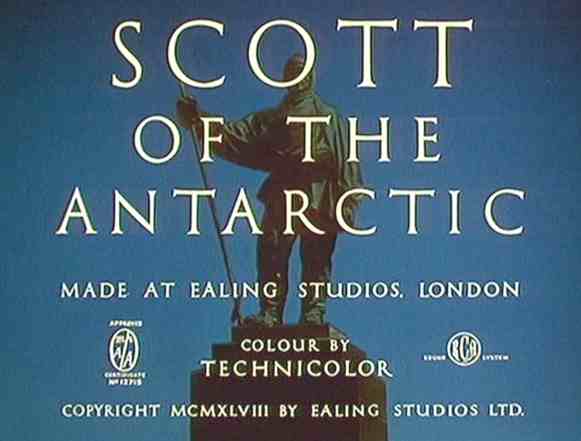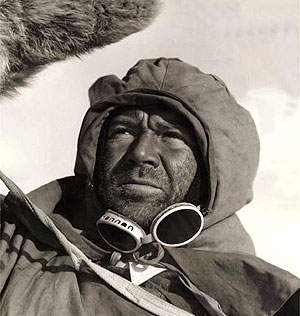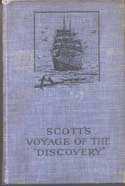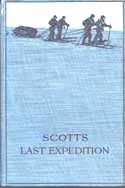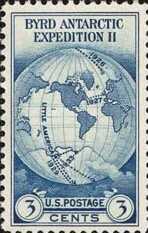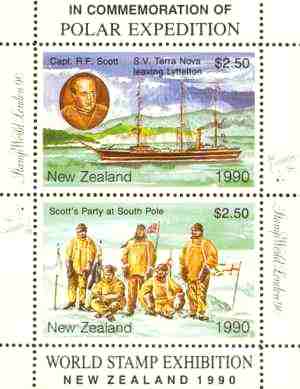|
SCOTT OF THE ANTARCTIC
|
|||||||||||||||||||||||||||||||||||||||||||||||||||||||||||||||||||||||||||||||||||||||||||||||||||||
| HOME | BIOLOGY | BOOKS | FILMS | GEOGRAPHY | HISTORY | INDEX | INVESTORS | MUSIC | NEWS | SOLAR BOATS | SPORT | |||||||||||||||||||||||||||||||||||||||||||||||||||||||||||||||||||||||||||||||||||||||||||||||||||||
|
Scott of the Antarctic is a 1948 film about Robert Falcon Scott's ill-fated expedition to Antarctica in 1910-12. Produced by Ealing Studios, the film was directed by Charles Frend largely on location in Norway. The script was by Ivor Montagu, Walter Meade and the novelist Mary Hayley Bell. John Mills played Scott, with a supporting cast which included James Robertson Justice, Kenneth More and John Gregson. The film is also known for its score by Ralph Vaughan Williams that was later reworked into his Sinfonia Antartica.
PLOT DESCRIPTION
John Mills stars as Commander Scott, the leader of the ill-fated and famed 1911 expedition to be the first to discover the South Pole. The British were up against the Norwegians in the Arctic quest for fame and honor which was won by Norway. By all accounts a realistic depiction of the ill-fated 1912 British expedition to the south pole. With so many frozen upper lips, the performances are rather buried behind balaclavas (at the end it's hard to tell who's who), and the studio colour backdrops are sometimes intrusive.
However, Vaughan Williams' score effectively upstages the dialogue; and the early scenes, when Mills scratches around for financing and assembles his crew, are a fair evocation of Edwardian England, even if the failure of the mission, and the reverberations that failure had for Imperial Britain, are beyond the scope of the movie. The movie says, with characteristic aplomb, well done chaps, at least you tried.
By the time of Scott of the Antarctic (1947), Mills was beginning to be frustrated by the limitations imposed upon him by movie makers. Though he studied the explorer's character at length, he was not allowed to complicate matters by hinting at Scott's notoriously short temper.
John Mills as Captain Robert Falcon Scott - Antarctic Explorer
SCOTT OF THE ANTARCTIC
Captain Robert Falcon Scott was born at Outlands on June 6, 1868, to John and Hannah Scott.......
Scott of the Antarctic (1948)
Genre:
Action
/ Adventure
/ Drama
(more)
MPAA: Rated PG for mild thematic elements and brief language.
[At
the South Pole.]
BOOKS:
Scott's
Voyage Of The 'Discovery'. This book celebrates the start of the heroic age of Antarctic exploration. It is quite a thick volume and reflects Scott's ability at writing. Ernest Shackleton was a member of the expedition and due to an attack of scurvy was declared unfit and returned after only one winter in Antarctica. There is no doubt that there was a major clash between Shackleton and Scott but good manners and the need to say that everything was a success was paramount. It is what is not said that makes this book interesting.
It
is amazing to think that this book is nearly 100 yrs old.
It was first published in October 1905, reprinted by
November 1905 (Smith Elder). There followed a steady
stream of new editions and reprints mostly under John
Murray. There was also mixture of books published in
1913/14 such as 'Voyages of the Terra Nova' and the
popular 'The Voyages of Capt. Scott retold from the
Voyages of Discovery and Scott's Last Expedition'. (Smith
Elder 1914). The USA version was published by Dodd
Meads.This book is not as common as 'Last Expedition'
which of course was the more dramatic story. First
editions fetch about £200.
Scott's Last Expedition: The Personal Journals of Captain R.F. Scott, CVO, RN.
A key source of primary evidence. It is of course, not perfect, and has been thoroughly edited. There is little personal opinion and it is a statement of facts and figures. It is however, the last will and testament of a great English explorer. Scott has the skill of writing (provided it was based on factual evidence - abstract thought probably drilled out of him in the Navy). The story is told in strict diary form and builds up to the now famous quote on finding that Amundsen had beaten him to the pole 'God this is an awful place'.
Here the diary distinctly turns as the realisation dawns that the return journey is not going to be easy. There is a photograph taken at the pole of the team looking at the camera. Look at it and see in their faces the emotional drain. Would they have made it back, if they had been the first to the pole in the same circumstances? The tragic deaths of Evans and Oates hits the reader- Scott's true feelings now only coming to the fore. To the end he knows he has a role to play and believes the failure was partially down to bad luck and to a certain extent it was, years later it was proved that the weather was unusually severe. The limitation of science at that time especially in relation to diet was not entirely Scott's fault. The diary is a 'must read' but its for what is not in it, more than anything else.
The book has been extensively published and reprinted over the years. Smith Elder first published in two vols. in November 1913 and it was to say the least, eagerly bought by the public. A second and third edition also came in November of that year and two further editions by the end of January 1914. It was not until 1923 that John Murray issued a one vol. edition. This was also extensively reprinted. By 1954 it was on its 11th reprinting. The 12th printing onwards had a foreword by Peter Scott. The Folio Society issued a good edition in 1964 with a foreword by Sir Vivian Fuchs.
Editions in the last few years have played around with the title. This seems to be mainly for the American market- 'Tragedy and Triumph: The Journals of Captain RF Scott's Last Polar Expedition.' ( Published by Kowecky & Kowecky 1993) or 'Scott's Last Expedition. The Journals' (Carroll & Graf 1996). Values- a 1913, 2 vol. copy fetches between £240 -£340. I have seen a first edition valued at £2,400 but this was perhaps because its was signed by the surviving expedition members!
THE CAPTAIN SCOTT SOCIETY
On the 15th June 1910, The 'British Antarctic Expedition, 1910', led by Captain Robert Falcon Scott, CVO, RN, made its final departure from Cardiff, leaving the United Kingdom for the journey South in the expedition vessel, SS Terra Nova, RYS. The expedition ended tragically, creating one of the great legends of adventure and heroism of the 20th Century. The Captain Scott Society was established in Cardiff, UK, to commemorate the association of the City with Scott's Last Expedition and to encourage the Spirit of Adventure that he inspired. To further this objective, the Society makes two Awards annually:
THE SOCIETY
The Captain Scott Society exists to perpetuate the memory of Captain Scott and his comrades and their association with the City of Cardiff.
The objects of the Society are to promote social and charitable activities with particular emphasis on adventure. It celebrates the anniversary of that original visit to Cardiff. The Society makes two awards, an annual 'Spirit of Adventure' award of £2,000 and a similar youth award, the ‘Sir Vivian Fuchs Award’ of £500. Both are awarded to expeditions that exhibit the ‘spirit of adventure’ that was so nobly demonstrated by Captain Scott and The British Antarctic Expedition 1910-1913.
On the 13th June 1910, members of the business community of Cardiff entertained Captain Scott, his officers and the scientists of the British Antarctic Expedition, 1910 to a dinner in the Royal Hotel, Cardiff. It was just two days before their departure South. On the 13th June 1982, the manager of the Hotel invited a group of friends to a dinner to celebrate the anniversary of that event. The Captain Scott Society was formed from those who attended that function and the Alexandra Room, in which the original dinner had been held, was renamed the Captain Scott Room.
The Society annually commemorates the anniversary with a dinner that recreates, as far as possible, the original occasion as documented in a menu card that survives from that dinner, bearing signatures of many members of the expedition.
In order to further the Spirit of Adventure, the Society makes two awards each year, the funds for which are raised from membership subscriptions. The Awards were recently doubled in value to a total of £2,500.
The Society also supports charities in keeping with its military and naval foundation. In response to an initiative of the Antarctic Heritage Trust, the Society has recently raised the capital for a Memorial to the golden age of Antarctic exploration. It has been erected adjacent to the lock through which the expedition vessel, the SS Terra Nova, departed Cardiff Dock in 1910 . The Memorial was unveiled by the Princess Royal in 2003.
The Society has been honoured to count as its Presidents, Sir Peter Scott, Sir Vivian Fuchs and Professor Robert Swan.
http://www.antarctic-circle.org/
Scott
of the Antarctic / Movie (1949)
Product
Details
Director:
Format: Color, EP, NTSC Rated: PG Studio: Republic Pictures Video Release Date: February 3, 1997 VHS Features:
From IMDb: Quotes & Trivia ASIN:
6303234461 Average
Customer Review: ***** Based on 2 reviews. Write
a review. Amazon.com Sales Rank: #1,577 in Video (See Top Sellers in Video)
Glossary
Nowadays, the southern continent is shared between 27 nations that have scientists based there. The things they study include changes in climate and the destruction of the ozone layer. For further information about the Antarctic today visit the British Antarctic Survey website.
LINKS:
Solar Cola drinkers care about climate chaos ...
.. Thirst for Life
(330ml Earth can)
|
|||||||||||||||||||||||||||||||||||||||||||||||||||||||||||||||||||||||||||||||||||||||||||||||||||||
|
This website is Copyright © 1999 & 2012 NJK. The bird logos and name Solar Navigator are trademarks. All rights reserved. All other trademarks are hereby acknowledged. Max Energy Limited is an educational charity working hard for world peace. |
|||||||||||||||||||||||||||||||||||||||||||||||||||||||||||||||||||||||||||||||||||||||||||||||||||||
|
AUTOMOTIVE | BLUEPLANET | ELECTRIC CARS | ELECTRIC CYCLES | SOLAR CARS | SOLARNAVIGATOR |
|||||||||||||||||||||||||||||||||||||||||||||||||||||||||||||||||||||||||||||||||||||||||||||||||||||
